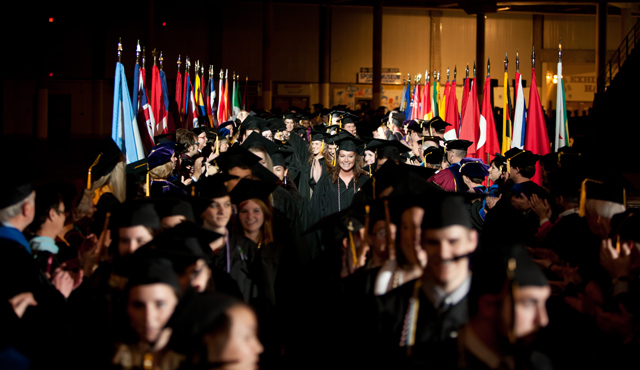Page 8 • (95 results in 0.071 seconds)
-

More than 850 students will graduate from PLU for the 2011-2012 academic year. Spring Commencement takes place Sunday, May 27 in the Tacoma Dome. (Photo by John Froschauer) In their own words Compiled and edited by Chris Albert This spring, new PLU graduates closed a…
enjoyed my time here, I trust that I am prepared to take my next steps; steps that will reflect PLU and the life experience and knowledge that I have collected here. What’s next? After graduation I will be flying to Baden-Württemberg, Germany to assistant-teach English through the Fulbright program for a year. I am unbelievably excited to begin this adventure and I look forward to seeing where it leads. It may lead to graduate school at the University of Oregon to pursue a degree in either Linguistics
-
Recent Graduates with the Major Titles StudentGrad YearTitle of Major Lindhartsen, Ian2020Music Business Magga, Mathilde2020Holocaust, Genocide, & Indigenous Studies Salisbury, Anna G.2019Pre-Dietics Lovrovich, Rachel P.2018Digital Media Johnson, Oliver V.2018Business of Visual Art Richards, Cierra N.2018Movement Linguistics Vetter, Marc J.2017Global Health Economics Miller, Tyler N.2017Photography and English Hall, Kelly J.2016Indigenous Studies Corboy, Lauren P.2015Modern Conflict and
-
semester hours, selected from the following: Latino Studies courses are taught in English. No more than one course taught in English may count towards the minor. HISP 321: Iberian Cultural Studies (4) HISP 322: Latin American Cultural Studies (4) HISP 325: Introduction to Hispanic Literary Studies (4) LTST 341: Latino/a/x Experiences in the U.S. (4) LTST 342: U.S. Latino/a/x Literary and Cultural Studies (4) HISP 401: Introduction to Hispanic Linguistics (4) HISP 403: Advanced Spanish (Study Away) (4
-
by the end of Semester II KINS 322 or equivalent Life Science Physical Science These courses, plus MUSI 341, must be completed prior to program completion. EDUC 320: Issues of Child Abuse and Neglect (1) EDUC 330: Professional Practice I (0) SPED 307: Foundations in Special Education (4) EDUC 332: Communities, Schools, and Students (2) EDUC 361: Teaching and Learning of Science (4) EDUC 429: Diversity Responsive Children’s Literature (2) EDUC 490: Linguistics and Language Acquisition (2) EDUC 370
-
Cultural Studies 12-28 semester hours, selected from the following: Latino Studies courses are taught in English. No more than one course taught in English may count towards the major. HISP 321: Iberian Cultural Studies (4) HISP 322: Latin American Cultural Studies (4) HISP 325: Introduction to Hispanic Literary Studies (4) LTST 341: Latino/a/x Experiences in the U.S. (4) LTST 342: U.S. Latino/a/s Literary and Cultural Studies (4) HISP 401: Introduction to Hispanic Linguistics (4) HISP 403: Advanced
-
Responsive Children’s Literature (2) EDUC 490: Linguistics and Language Acquisition (2) EDUC 370: Professional Practice II (0) EDUC 372: Teaching and Learning of Reading (4) EDUC 373: Teaching and Learning of Mathematics (4) EDUC 374: Management and Student Engagement (4) EDUC 375: Technology Integration: Framing and Meaningful Design (2) EDUC 327: Instructional Systems and Design (3) SPED 377: Instructional Methodologies for Inclusive Classrooms (3) EDUC 402: Internship I (0) EDUC 404: Teaching and
-
Our Departments Show more information about these links Anthroplogy The four fields of anthropology are cultural anthropology, how people live in groups today, linguistics, the study of language, biological anthropology, the study of humans and other primates as physical beings today and in the past, and archaeology, the study of cultures in the past. Chinese Studies PLU’s Chinese Studies Program is an interdisciplinary program which is designed to provide students interested in China a broad
-
Bio: I am a proud native of Tacoma and first generation college student that began my formal second language study in high school. My grandparents were native speakers of Gaelic who immigrated to Tacoma, so my love of languages and cultures started early. I stayed local for college, earning my BA in Spanish from WWU and my MA and PhD in Romance linguistics from the UW. I was fortunate to be able to study away in many locations over the years, including Spain, Guatemala, and Russia. In addition to
-

& Indigenous Studies Did you know? Every year, one to three PLU students graduate with an individualized major that they have designed. Did you know? Recent individualized majors include Music Business, Global Health, Business of Visual Art, Movement Linguistics, Digital Media, and Holocaust, Genocide & Indigenous Studies. DISCOVER About Calendar Campus Map Land Acknowledgement Careers at PLU Lute Locker PLANNING Student Payments Textbooks Make a Gift Conference Planning RESOURCES Privacy Non
-
2010 she has been conducting participant observation research with the authors of romance novels, examining the gendered aspects of the career and how women experience writing what has been described as the most popular, least respected literary genre. At PLU, Gregson has a long record of faculty governance and leadership experience. She has served on and chaired the Campus Life Committee, the Rank and Tenure Committee, and the Governance Committee, and has served as Chair of the Faculty, Vice
Do you have any feedback for us? If so, feel free to use our Feedback Form.


